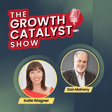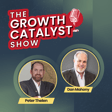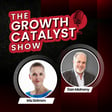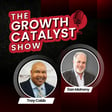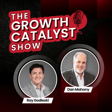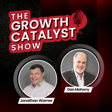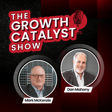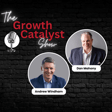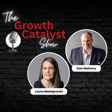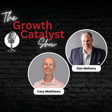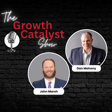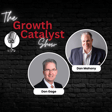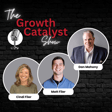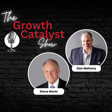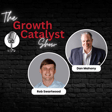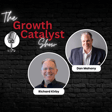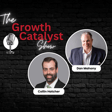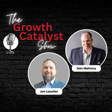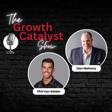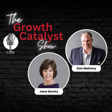Become a Creator today!Start creating today - Share your story with the world!
Start for free
00:00:00
00:00:01

Navigating the World of M&A and Investment Banking with Don Bravaldo
Discover the art of mergers, acquisitions, and strategic exit planning with Don Bravaldo, President of Bravaldo Capital Advisors, Inc. Gain exclusive insights into the keys to successful M&A deals in today's economy. Benefit from Don's expertise with real-world success stories and valuable tips for businesses looking to grow and expand.
Transcript
Introduction to The Growth Catalyst Show
00:00:01
Speaker
Welcome to The Growth Catalyst show where we believe that growth could come in many forms, professional, personal, company, sales, you name it. I'm your host, Dan Mahoney, founder of Transcendent Sales Solutions and a guide to a world of growth possibilities. I've spent my career empowering companies and their people with strategies that accelerate growth.
00:00:19
Speaker
I'm here to bring you stories of these business leaders and their trusted advisors to gain insights into their journeys and learn how they fueled their own growth. Just maybe their journey could become part of your own growth story. Are you ready? Let's grow.
Introducing Don Brevaldo and Exit Strategies
00:00:34
Speaker
Welcome to the next episode of The Growth Catalyst Show. I'm your host, Sam Mahoney, and I'm so excited to have my next guest here today. Don Brevaldo is the president of Brevaldo Capital Advisors. He leads a boutique investment banking practice serving privately held and closely held family businesses that are interested in planning and executing exit strategies, achieving growth through acquisitions, or seeking access to debt or equity capital to achieve their corporate strategy. Don, welcome to The Growth Catalyst Show.
00:01:04
Speaker
Well, thank you, Dan. Good morning to you. Good morning. Glad to have you here today.
00:01:11
Speaker
I've known you so many years and I've learned so much even more about you as I've done some research getting ready for our discussion today. So I do know you're from Alabama, correct? You grew up in Alabama, correct?
Don's Background and Career Beginnings
00:01:25
Speaker
Actually, you know, small correction, I am a Georgia native. You are, okay. The heart is over there in Alabama and Auburn, Alabama these days where my mom
00:01:36
Speaker
and dad re-retired so Auburn fans driven through. So you are a Georgian so you know there's been recent news so you are not like in sorrow and about Nick Saban retiring at this point. There might have been a little party at the at the bravaldo household considering the new recruiting class it's likely to show up.
00:01:59
Speaker
But I did grow up in Southwest Georgia. That's really always home for me, a little town called Albany, Georgia. And you got to say it like that, not to be confused with Albany, New York, of course. The most other famous person I know there other than Paula Deen, I know from Albany, Georgia. Man, that's some good cooking. And actually grew up with one of her sons.
00:02:23
Speaker
It's been fun to watch how mom has done with that business. That is awesome. So when you went to Auburn, you like right out of the bat, decided that accounting and being an accountant was kind of what you wanted to do, correct? It was by default. I had a dad that, you know, had been in manufacturing, had an engineering background.
00:02:48
Speaker
Uh, and he basically said, you know, son, if you're not willing to, to go through the calculus and, and, uh, you know, the engine, the rigorous engineering program at a football school, the next best thing's going to be to pick the hardest thing in the business school. So that, that happened to be accounting. And, uh, the language of business is, uh, is how he, as well as other, other business leaders that he introduced me to.
00:03:14
Speaker
put a description of accounting, which sounded good to me. Also, the fact that it could lead to so many different things later on in your business career. When did you make the decision like I'm going to go audit versus tax? When did you kind of make that decision? I think it occurred about the time at Auburn that I had a tax class and I figured out just how boring this could be, you know, for a young college student. And
00:03:43
Speaker
On the audit side, it sounded intriguing to really look under the covers, figure out exactly what made a business ticket and assess the risk involved in that business. It just sounded a lot more appealing. And the fact that you got to travel around it and see a lot of different companies where the tax people usually were stuck back in the office. So that was an easy decision when I started interviewing with accounting firms.
00:04:11
Speaker
And your first big position out of school was Arthur Anderson. It was. Yeah. I had the opportunity to interview with a lot of big six accounting firms at the time. It was a tough decision. There's a lot of really good firms between E&Y and Deloitte and others, but ultimately chose Arthur Anderson and off, you know, look back very fondly and very happy that I did. I had an incredible time.
00:04:41
Speaker
they're working with some of the best and brightest. And the Atlanta office was one of the premier offices for the entire Arthur Anderson organization. Did you step into, did you take the CPA and become a CPA while you were at Arthur Anderson? Or did you do that before you, before you started? I finished it up, uh, towards the tail end of my time with Anderson, um, and got that under my belt. And I think,
00:05:08
Speaker
You know, when I describe the difference between the two, focusing a little bit on, you know, the earlier business career and auditing at Anderson, I had some of the biggest blue chip public company clients. But as a junior auditor, it was really hard to see, you know, any path to making a difference.
00:05:29
Speaker
When you get stuck auditing cash for an entire month at a Delta Airlines or Georgia Pacific, you know, for a pretty young entrepreneurial minded guy, it was a little bit torturous. So I very quickly realized that while I really enjoyed, you know, the incredibly talented and gifted intelligent folks that I was with at Anderson, that the client base, you know, really didn't suit my background.
00:05:56
Speaker
and ultimately decided to make a switch.
Transition to Mergers and Acquisitions
00:06:00
Speaker
And I ended up at a regional accounting firm called Bennett Thrasher where I served closely held family run businesses, not small businesses, certainly businesses of size and scale, but nowhere near what an Anderson client would be. And found that that was really the kind of client that I enjoyed working with.
00:06:21
Speaker
and truly over time in the first couple of years really became a meaningful advisor to my client base there at Bennett Thrasher. Many individuals in your position take that route of I'm going to be a partner at a CPA firm and I'm going to continue to that's the track, but you took a whole different path. How did you decide that M&A advisory was something that you really wanted to get into?
00:06:51
Speaker
Well, not to get too boring on the accounting front, but there's a technical society, I mean, organization that really leads accounting called FASB. And it seemed like every year they were making things more and more complicated, which for a guy that hated being chained behind a desk meant the increased amount of technical responsibility equaled less funds.
00:07:20
Speaker
And so right about the time I realized that the longer I would stay in audit, I would probably do less advising of clients. I had a recruiter come along and just present a job opportunity to me, Dan, to make an entire career switch and join a public company's merger and acquisition team and travel around the country buying businesses. And that to a young guy, single pre-9-11,
00:07:49
Speaker
uh, you know, sounded pretty appealing. And so I jumped at the chance. So that, so you started working at a larger firm, a public firm. I didn't know that. Yeah. Uh, Hanger
00:08:01
Speaker
It's still around today. It recently, I think within the last year, became a private company again after decades when a big private equity group took it private. But it had been a public company up until last year. And they are one of the larger niche health care players that you've never heard of until something goes wrong. They are the leader in providing orthotic and prosthetic services.
00:08:30
Speaker
as well as distributor of those products in the country. And so my job as a young M&A manager and director was to travel around the country and spot target companies that we wanted to acquire and approach those companies, build relationships, value those businesses and negotiate and extend offers and then kind of manage the due diligence process.
00:08:55
Speaker
You know, I didn't just start on day one doing that. I had a fantastic boss, best boss I've ever had in my business career. Take me under his wing and really show me how to do what we were doing. And this was, you know, the mid to late nineties when
00:09:13
Speaker
the current consolidation and roll-up craze that's going on right now in America driven by private equity, you know, really was unheard of. And so we were busy consolidating a mom and pop industry in the orthotic and prosthetic industry. Almost every one of these patient care service organizations was owned by a private business owner. And so along the way, during the three and a half years that I worked at Hanger,
00:09:41
Speaker
I just saw some fantastic businesses that those owners had built over their careers and their business lifetimes, sometimes multi-generations. And when it came time to exit, they knew to pick up the phone and call the biggest player in the industry.
00:09:58
Speaker
But what they didn't know how to do was prepare the business for sale. They didn't know how to create competition. They didn't even know the first thing about maybe hiring an advisor to be on their side. They'd have a good CPA or a well-meaning attorney that had been with them over the corporate history of the organization. But those people, great professionals that they are, it's not their job to do M&A transactions. And here we were, a big public company with all the resources.
00:10:27
Speaker
buying probably 10 or 15 businesses each year. We knew what we were doing. We knew how to provide great returns to our shareholders. And really wasn't my job to point out, hey, if you'd only done X, Y, or Z. And I mention all this because not to shortchange that time at Hanger. I'd probably still be with them today because of the wonderful patient care work that we did.
00:10:54
Speaker
helping, for example, veterans that have lost a limb overseas, you know, fighting for freedom and protecting the United States. Loved what they did. Hanger just got into some financial difficulty and hit a rough patch and they had to suspend the M&A program. And so, you know, I had a
00:11:13
Speaker
a corporate career that I guess is on par these days for where society is. But back then, three and a half years was a short corporate career.
Advising Small Businesses on M&A
00:11:22
Speaker
But I was, I guess, bright enough to see that there was a business opportunity. And somewhere in the marketplace, around $100 million transaction size, there are plenty of really professional advisors that will help a private business owner
00:11:42
Speaker
get a business ready for sale. When you get up into the hundreds of millions of dollars in public company world, you got plenty of investment banks that will do those M&A transactions. But as you go south from $100 million and certainly below $50 million, there's really a desert of advisors that are professional, that
00:12:07
Speaker
are competent, that are willing to roll up their sleeves and work with that size business to help that business owner achieve their goals. And so I saw a market opportunity and as early as 2000, I've been advising private business owners and assisting them with either preparing for, or most importantly, executing on their exit strategies, primarily merger and acquisition and selling to third parties.
00:12:36
Speaker
So let's fast forward a decade to 2011.
Forming Bravaldo Capital Advisors
00:12:40
Speaker
What was the decision or what was in your thinking about starting bravado capital advisors and going out on your own? Well, you know, in 2000, I actually started on my own as a single shingle entrepreneur. And for about six months, you know, I called all my friends at Anderson.
00:13:00
Speaker
And they were like, hey, bravaldo, I love you, but, you know, I'm not going to, you know, I'm not going to send scientific Atlanta to you to do M&A transactions. The board's not going to allow you to do that. And then I would call my old partners at Bennett Thrasher and they would say, well, look, you know,
00:13:17
Speaker
uh, at the size we're at right now, you know, we usually only have maybe one or two clients each year that, that we find out want to sell. So we're happy to call you, but to be honest with you, one of the partners pulled me aside. It was a good friend of mine, Tom Burns, who has recently passed away. Fantastic man. I learned a lot from on the valuation side of things. He ran the valuation practice, but Tom said, you need to surround yourself with sales and marketing people.
00:13:43
Speaker
because, you know, Brevaldo, you've always been in the CPA world and clients were coming to you at Anderson here at BT. And that made a lot of sense. And so I affiliated with a group of folks that were starting a higher end business brokerage. And my goal was to run and build and run the large transaction practice there. And so I did that. So for, I guess, a period of around six and a half, seven years,
00:14:12
Speaker
You know, I built that organization with that group of partners, a couple of folks that were, that still are icons in the industry, you know, Sarah Burton, Chet Walden, and founder of that business. And, you know, I became a big piece of that business. And it just made sense seven years in to split off and really focus solely on boutique investment banking level of service for clients that
00:14:42
Speaker
you know, anywhere from, you know, minimum of 10 million in annual revenue to 300, you know, transaction sizes of 200 million or less. And so that was hard to do within kind of a business brokerage organization that was trying to serve both small business and a little bit larger. So 2010 was that catalyst year for me. I think I would have done it sooner, but the great recession got in the way. And I, you know, I guess
00:15:10
Speaker
It was a little bit intelligent in that I said, look, if nothing's going on in M&A, I can either stay where I'm at, trying to help this firm make a little bit of money and defer overhead, or I can go out on my own and make no money and share all the expenses. So I did wait a couple of years during the Great Recession.
00:15:29
Speaker
Probably one of my least favorite times advising private business owners because most of the M&A work was distressed work. But we did what we had to do and we helped a lot of business owners out of some real GMs and personal guarantees with their banks while we sold their business assets and helped them recover as much money as they could.
00:15:50
Speaker
Let's take a moment for a quick word from our sponsor. This episode of The Growth Catalyst Show was brought to you by Transcendent Sales Solutions. Whether your company is facing uncertainty, declining sales, or resource limitations, Transcendent Sales has the solution. Their team has decades of experience helping businesses find alignment to meet their growth goals and transforming underperforming sales organizations into revenue producing market leaders.
00:16:13
Speaker
They take a hands-on, results-oriented approach to solving sales challenges. Visit TranscendenceSales.com to learn more and subscribe to the biweekly Growth Catalyst newsletter for insightful growth strategies. Transcendence Sales Solutions, empowering businesses to reach new heights. And now, back to the show.
Executing Successful Transactions
00:16:32
Speaker
I've got to know you very well the last five and a half years and I've seen bravaldo capitol grow exponentially. Talk a little bit about some of the things you've learned along the way for being a successful entrepreneur like yourself. Sure. So our origin really was 2010 and that's when we announced things to the world and it has been
00:16:55
Speaker
You know, slow and steady growth for the most part, and then big growth spurts. But you know, that's our business, Dan. I mean, you know, our business is dependent, highly dependent on, you know, large transactions, small volumes.
00:17:10
Speaker
And so, I've been committed to growth and I've done that, bootstrapping the business and not bringing in outside capital or investors. And so typically when we have done incredible work for some of our larger clients and had outstanding outcomes, we've set money aside to go hire people and had a good cycle that continues to be virtuous and feed on itself. And so,
00:17:39
Speaker
I've been excited about growth and the key ingredient in that always comes down to people. I've been very blessed to have incredible people work with me both as alumni now and as the current team. Our best assets walk out the door every day and so our clients are really benefiting from having an outstanding dedicated team of professionals.
00:18:09
Speaker
Many with a lot of experience or junior people are working as a team with our experienced folks. And the best way to describe our business in terms of professional services, we really are like a SEAL Team Six. We will train, get a business ready for sale.
00:18:32
Speaker
And then we'll execute on a competitive auction style confidential sales process. And to really do it to the extent that we do, it requires working as a team. Typically we've got three or four individuals working on each one of our projects and each one of our team members are willing to put in 80 hours a week and do the sprints when necessary to have a successful transaction and to drag things across the finish line.
00:19:02
Speaker
What are some key factors? I mean, I know you work a lot of business. What are those key factors that really are going to contribute to the success of a successful transaction versus a not so successful transaction?
00:19:16
Speaker
Well, a portion of it is just being in the right place at the right time. Timing is everything, right? But you got to have a good business to start with. You can't have a bad business and just get lucky. I guess some people can do that by maybe having some intellectual property and being in the right spot at the right time. But for the most part,
00:19:37
Speaker
I tend to come across business owners who spend a career, whether they're young entrepreneurs that have put in the hours and put in 10 years of hard work and blood, sweat, and tears, or whether it's a second generation or a third generation family business that have put their life into it, but yet the kids don't want to be the fourth generation. In both cases,
00:20:02
Speaker
there's a good underlying asset that has been painstakingly built. And so some of the qualities that we are looking for, or if they're not present, what we recommend, if the timing doesn't need to be now to build into the business, I think the number one thing I see at the smaller end of the clients that we serve is customer concentration.
00:20:28
Speaker
And that's one of the number one value detractors for a business, for a buyer, is recognizing that there's a 10, 20, 30, 40 higher percentage customer that if they leave, what business do you have? And a lot of business owners don't understand that. They've had a relationship. Maybe their customer started the same time they did. They've grown up in business together. They're never going to leave us.
00:20:55
Speaker
But a lot of those ties relate back to that business owner who now wants to retire or exit. And so you and I, Dan, have worked together when we come across those opportunities to get you in there to really help that sales team start to diversify that customer base. It'll make it a lot easier to sell and it'll make it a more valuable business. So that's probably the number one thing. And then I would say smaller companies, they're financially immature,
00:21:25
Speaker
They focused on having a great product and a great service and a great team, but they're not run like a public company. And so we like to spend some time helping them get their financial house in order, getting their legal house in order. Because in today's M&A market with the professional buyers, whether they're private equity or whether they're strategic corporate buyers, I'm telling you it is a very, very intensive data-driven process.
00:21:54
Speaker
And they are going to look under every rock, turn over every stone, find every little hidden problem or perceived problem in the business. And so one of our jobs, other than creating a competitive process and helping a client receive offers for an illiquid asset, which we had to make a market for, is to help them mitigate risk.
00:22:23
Speaker
Because there's two big drivers of valuation. It's future cash flows and being able to really have some insight into those future cash flows. The true definition of valuation is taking future cash flows and discounting them back to present value, but adjusting for the risk that those cash flows will be sustainable.
00:22:52
Speaker
And business owners typically get the concept of, you know, look, if somebody is buying this for the future, they're going to need to see inside into it. Often historical performance is a good indicator of future performance or it's what a buyer wants to pay for. They're buying it for the future, but they'll pay you for what you've done in the past. But what business owners forget
00:23:17
Speaker
is risk, that whole, and that definition, that key risk area, reducing risk.
00:23:24
Speaker
making sure that the cash flows are sustainable. And so anything you can do, either short-term or long-term to reduce risk in your business is also going to be a big driver of valuation. So I'm sure I've gotten off track from the original question. No, not at all. And one of the things I see quite often, and I know you do too, is you have these businesses, they want to sell their business, but they want to do it quickly.
00:23:47
Speaker
and they wanna move quick and they wanna sell it and I'm always amazed at how much time you guys and your team puts into these businesses to get them ready for that event.
Guidance on Selling a Business
00:23:59
Speaker
What are some things businesses could start doing as like, hey, I'm thinking about selling my business in three, four, five years. What are some things that, you know, a few tips that they could start doing right now to help maybe minimize that, mitigate that, or minimize that risk actually?
00:24:14
Speaker
Sure. Great question. And so let's start with trying to visualize the time frame and then in a timeline, you know, our work, if we're going to do a highly competitive process, what I mean by that is, you know, really make a market and, you know, maybe talk to, you know, 50, 60, 70 private equity groups and probably an equal number of of public or private company strategic buyers.
00:24:42
Speaker
That's a six to nine month process from start to finish, from engagement of our firm to closing a deal, six to nine months. And that's assuming that the business is in shape and ready to go. So if you're not, you can just go ahead and add untold months to that. For example, we were introduced to a great business last year, had a lot of strategic buyer interest,
00:25:11
Speaker
a lot of growth, but financially, their financial statements were, you know, basically shoe boxes and they've had to have forensic accountants go back and recreate things. Now, some of that, some systems errors and people errors and all kinds of stuff, but it's really thrown their timing off on being able to transact. So getting back to that timeline, what we like to do is get introduced to a business at least
00:25:41
Speaker
you know, two to three years in advance of a sale. I think you could make an argument to be able to plan for an exit. You know, you could do it over a five year period of time. That would really give you plenty of time to not have to do too much along the way. But some of the keys to look for, number one, if you're an inventory business and your valuation is say 25 million or more,
00:26:08
Speaker
I'm going to recommend that you step up your level of outside financial assurance and reporting. The old auditor in me is going to say, get your CPA to go and get a true audit because most of the size companies, the buyers that you're going to talk to are going to want to see an audit, which specifically with inventory companies is important because there's a physical observation of your inventory by an outside party.
00:26:38
Speaker
And that's a key. And look, an audit is a gold standard. It's expensive for a certain size business. It's an investment that probably doesn't need to be made. But I've seen it provide big returns for a business to get that outside assurance. And then internally.
00:27:00
Speaker
You need to have a CFO or a heavy controller. You need to have a good accounting function because let me tell you, I need financial information. Our team needs financial information on a day by day basis.
00:27:14
Speaker
And a lot of businesses, you know, private owners, you know, they just have the tax return to worry about, they have the bank to worry about at the end of the year to give them, you know, an outside CPA reviewed financial statement. So, you know, there's, there's a big switch between, you know, being able to, to close your books and provide a true accrual based financial statement on, you know, day 15, you know, the following month from, from that month's close.
00:27:41
Speaker
and then being able to rattle off a trailing 12 months historical EBITDA to give to your financial, your M&A advisor, then a business owner that just said, how did we do last month? Give me a P&L. And so when I say EBITDA, that's jargon in our industry, but it's a big focus. When you start to explore selling your business, it stands for earnings before interest, taxes, depreciation, and amortization.
00:28:11
Speaker
That's a key number. It's not the only number, but it is a key number that buyers are going to focus on. Can you share, and I know there's plenty of them that you could probably share, but one that comes to mind of a success story of a deal that you've involved in, that you guys are proud of, and everything kind of lined up the way it should be? Sure. That's an easy one to answer.
00:28:38
Speaker
the very fortunate opportunity to meet a couple of incredible entrepreneurs, brothers, Michael and Philip Gosling, founders of a company called Do My Own. They started that business in their parents' basement. And it's an e-commerce business that provides pest control products sold through an online website.
00:29:08
Speaker
And they've since expanded to include lawn and garden products as well. But starting in their parents' basement to building an organization that had over 150 to 175 employees at the time we were working with them back in 2019 is when we got introduced to them. And Michael and Phillip are some of the smartest folks I've ever worked with.
00:29:35
Speaker
And they were also really good about surrounding themselves with a professional advisory team. Some members that our firm was able to recommend and others that they had found on their own. But collaboratively, they took advice really well. And that business excelled from a technology standpoint, from a warehousing and distribution standpoint, from a marketing standpoint,
00:30:03
Speaker
But it was financially immature. They did not have a CFO. They did not have a rigorous accrual-based financial statement capability. They were really a modified cash basis what they needed to report on taxes because they had never thought about selling. From a timing perspective, COVID actually happened while we were helping them get their business prepared.
00:30:32
Speaker
and who would have known at the time how quickly the world would change and how important e-commerce would become. However, we had started to do our research and put together an incredible
00:30:49
Speaker
uh you know marketing campaign both to to strategic buyers and to high quality private equity because these are young guys where you know maybe bringing in private equity money you know being able to take some money off the table reduce risk use other people's money to grow it was a real option uh if if the strategic deals you know weren't the right fit or or the highest valuation um so you know all of this unfolded during covid you know we all you know
00:31:19
Speaker
did our thing. We met with people probably we weren't supposed to. We overcame technology and did remote management meetings with buyers. All of a sudden, everybody recognized in the buying community how important having e-commerce capability would be. And our clients had done a wonderful job of developing
00:31:47
Speaker
their own proprietary software for warehouse management. And it was tailored to their specific types of products. So as it turns out, as we ran the process, as we identified buyers and eliminated others and shrank it down to a very manageable pool and started to meet with these groups, one group in particular recognized that they, not only did they like this asset, do my own,
00:32:17
Speaker
but they recognized that they could take that technology and extend it throughout their organization. So at the end of the day, when it came time for bids, these people were able to pay a premium. And for them, it was probably a discount because it's transformed their organization. It's made them more efficient.
00:32:43
Speaker
So I always call those a win-win transaction, and it's what we strive for. But our clients certainly had a win, and they were just incredible to work with. In some high-pressure situations, they were willing to crack a joke. We were willing to crack a joke. We had a lot of fun together, and we had a terrific outcome. And I think that
00:33:09
Speaker
I can't tell you that every project we undertake has that kind of financial outcome. But for the most part, everything that we commit to, we're going to do our job, which is to make a market and to give that business owner, you know, give them buyers that make offers to buy their business. And I can only think of one time
00:33:36
Speaker
in a 24-year career now of doing this for private business centers, providing M&A advisory during the great recession where we didn't get an offer for our business. Now, notice I didn't say that every offer we get is going to be something that our business center is excited about. And that's the key, right?
Conclusion and Contact Information
00:33:57
Speaker
Yeah, well, Don, this has been a really great conversation. The last question I have for you is if somebody is interested in learning more about Armando Capital Advisors, what's the best way to check you out and find out about you and contact you? The easiest way to get in touch with us is check our website and, you know, give us a call. We've got our numbers listed.
00:34:21
Speaker
You know, my email is my first initial last name, dbrvaldo at bc-advisorswithanest.com. We've got an info ad on the website. We're really easy to get in touch with. So love to talk with anybody. You know, we don't mind spending, you know, good time with people to, you know, give them some education on the M&A process and what to look for and, you know, help them assess whether their business is a really good candidate or not.
00:34:52
Speaker
Don, I want to thank you for not only your friendship, but taking some time today to appear on the Growth Catalyst show. And I'll see you up the road. Thank you so much for everything. Thanks, Dan. You're a great friend as well. Have a great day.
00:35:08
Speaker
And that's a wrap for today's episode of The Growth Catalyst Show. Remember, you can take these stories of growth and make them part of your own journey. Learn from them, draw inspiration, and let them guide your path of growth. I'm your host, Dan Mahoney, and I look forward to our next journey together. If you've enjoyed the show, please subscribe and leave a review. Until next time, keep growing.
